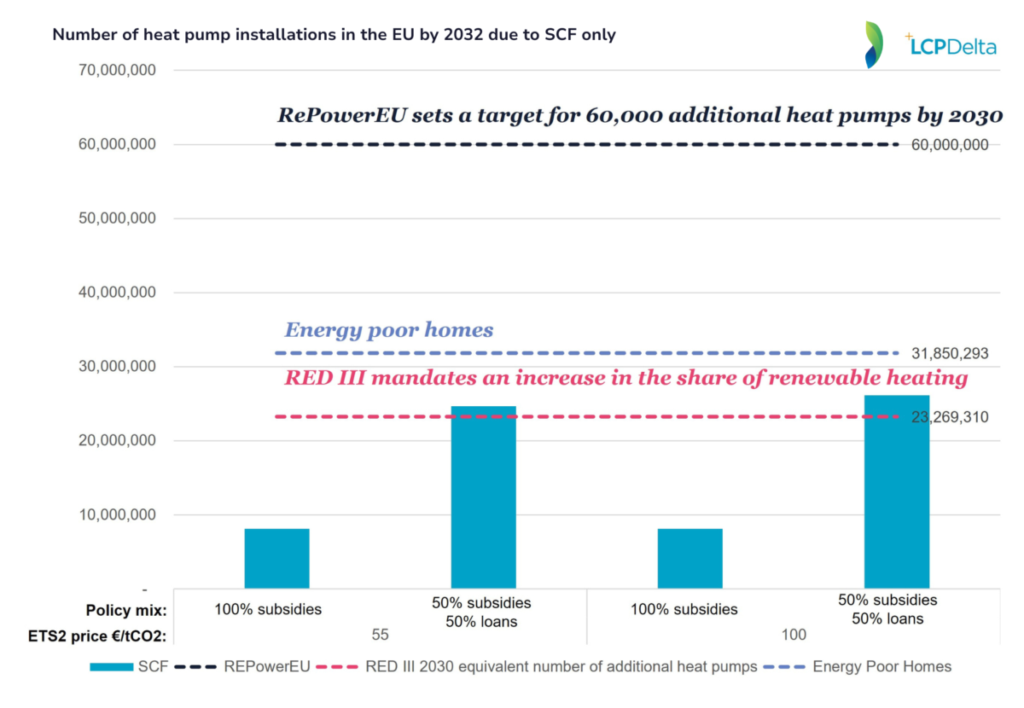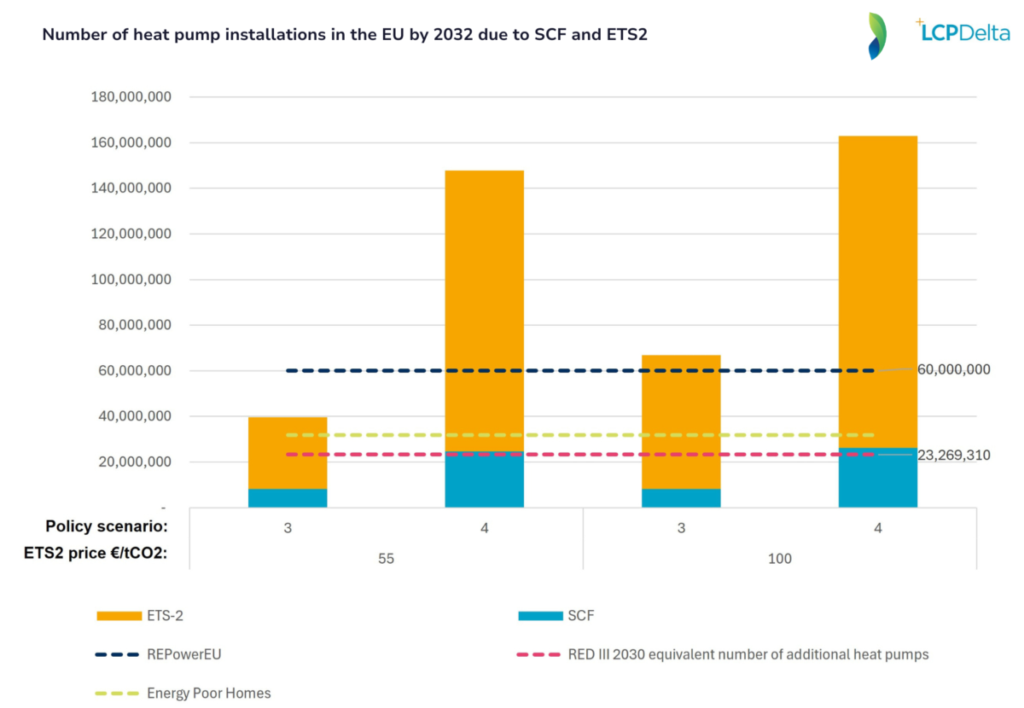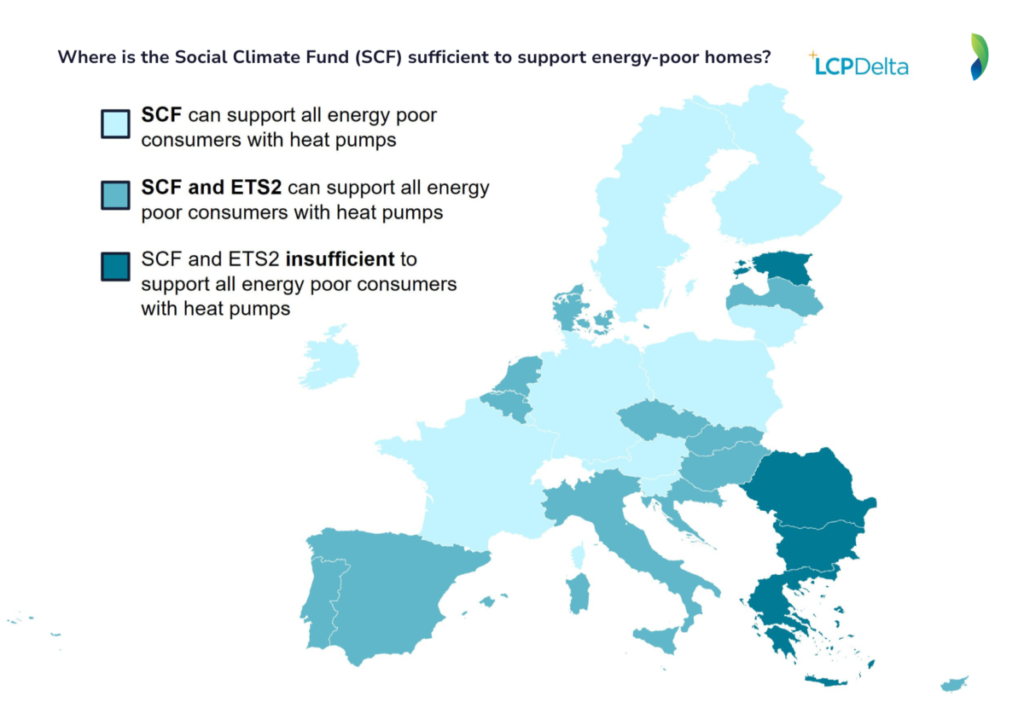Social Climate Fund could deliver heat pumps to 20 million energy-poor households across Europe, new study finds
A new study finds that by investing one-third of the Social Climate Fund, the EU could subsidise up to 20 million heat pumps by 2032 — enough to reach all energy-poor households in nine EU countries and cut EU gas demand by 11%, nearly as much as the EU imported from Russia in 2024.
The EU Social Climate Fund (SCF) could be a game-changer for Europe’s heating transition, accelerating the rollout of fossil-free technologies like heat pumps and solar thermal systems.
Commissioned by the European Environmental Bureau (EEB) and carried out by LCP Delta, the study finds that one-third of the SCF alone could pay for over 20 million heat pumps. Countries like Germany, France and Poland could use their share to provide one to every energy-poor household.
However, across the EU as a whole, this funding would cover only 65% of all energy-poor households, indicating the need to tap into broader ETS2 revenues. The study estimates that if Member States combine one-third of the SCF with one-third of ETS2 revenues — expected to exceed €260 billion — they could deploy 100 million heat pumps across the EU. This would not only shield households from fossil fuel price shocks, but also help the EU meet its climate targets for heating and cooling.
Read the full report.
Quote
“Numbers don’t lie. The Social Climate Fund could deal the final blow to our dependence on Putin’s gas,” said Davide Sabbadin, Deputy Policy Manager for Climate and Energy at the EEB.
“One of the main barriers to heat pumps is their upfront cost. The new carbon price will change that: it will both discourage gas use and generate revenue to support the shift to clean heating. These findings show that by recycling part of the carbon revenues into a mix of grants and zero-interest loans, EU countries can support their energy-poor households in leaving fossil heating behind.
But carbon revenues are no silver bullet. Without fixing electricity taxes and scaling up support for heat pumps, this funding won’t be enough to fund clean heating in countries like Romania or Bulgaria”.


Impact varies across EU states
The study also highlights significant disparities across Member States. Countries like France, Poland, Portugal, and Germany could already support all energy-poor households using one-third of SCF funds alone, thanks to existing support schemes.
Others —including Italy, Belgium, and Czechia— will need to draw on additional ETS2 revenues to close the gap or improve national support policies to meet the same goals.
In contrast, Romania, Bulgaria, Greece, and Estonia are unlikely to reach all energy-poor households even when combining both funding streams. The main obstacles: weak national support frameworks, high electricity taxes, and limited incentives for clean heating.
These differences reflect disparities in housing stock, energy taxation, and national support schemes across the bloc. In some countries, subsidised loans may be enough; in others, full grants are essential to enable households to make the switch.

Decisive moment for Member States
With National Social Climate Plans due by June 2025, experts are urging governments to prioritise clean heating —particularly for vulnerable households— when deciding how to spend this historic carbon revenue windfall.
ENDS
Notes for editors
- Energy-poor households are defined by the EU Joint Research Centre as those unable to keep their homes adequately warm or struggling to pay energy bills on time.
- The ETS2 (Emissions Trading System 2) introduces a carbon price on fuels used in buildings and road transport from 2027. Revenues will be returned to Member States for national climate and energy spending.
- The Social Climate Fund (SCF) is a new EU financial mechanism designed to cushion the social impacts of carbon pricing in the buildings and transport sectors.
- Recycling part of ETS2 revenues as direct payments to households is crucial to make carbon pricing a socially fair and politically sustainable tool.

